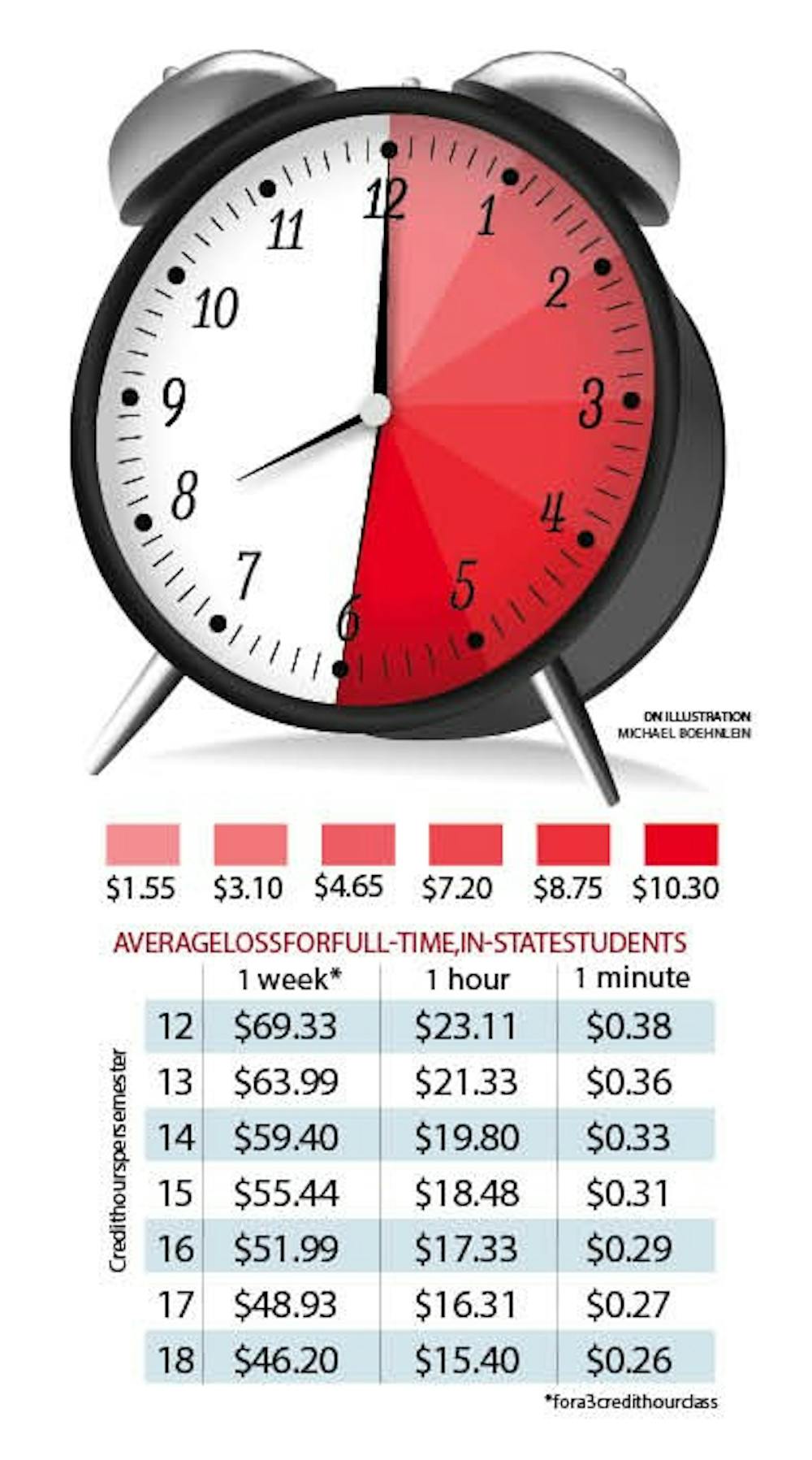Skipping one hour of class a week costs Ball State students about the same amount as two movie tickets, a fifth of alcohol, dinner or an iPhone case.
For a student taking 15 credit hours in a semester, a three-credit hour class costs $55.44 each week. Dividing the cost of tuition each semester by the number of credit hours per week breaks down the exact cost of each class.
Ball State’s in-state tuition, excluding extra fees, financial aid and room and board, is $4,159 per semester for the 2012-2013 academic year. At this rate, skipping a three-credit hour lecture class just one time costs about $18.48.
For out-of-state students the cost nearly doubles because tuition is $11,494, without fees or room and board, and the cost for a three-credit hour lecture class is $153.27 per week.
Sophomore architecture major Max Wurster said he knows that without a college degree, people in the job market won’t consider him, so he feels the money is worth it.
“I am fortunate enough to have my parents pay for it and [going to class] is something I feel I owe to them,” Wurster said. “Its not healthy to throw away money like that.“
Dan Boylan, a finance instructor. said he would recommend strong students in manageable subject areas take the maximum 18 credit hours, getting more classes for the same amount of money.
“I just think students need to get the most out of their money at school,” Boylan said. “There are so many programs, so many opportunities, so many leadership conferences; they need to take everything in. That’s what it’s here for.”
Michael Hicks, director of the center of business and economic research, said high costs can be a motivator for students to attend class.
“Skipping rates at more expensive universities are much lower and graduation rates at more expensive universities are much lower,” Hicks said. “It is probably the more expensive college is, the more seriously students tend to take their part of their education.”
Hicks said although skipping classes could be costly to the university by lowering graduation rates, the real damage is to student’s academic performance.
“As a professor, I assume that students are rational adults and if they choose not to attend, they are making their own benefit-cost analysis,” Hicks said. “When students don’t attend, I don’t formally grade upon it, but I can tell you lack of attendance is probably the leading indicator of failing a class or doing very poorly in it.”
Cierra Payton, a freshman communications major, said the amount of money she is paying for class wouldn’t really change her mind about skipping class.
“In the morning, when I am really tired and I don’t really want to go [to class], I don’t think I would think about that,” Payton said.
Boylan motivates his students to attend his class by telling all of his Personal Finance for Fiscal Wellness classes what they pay each week to take his one-credit hour course.
“When I announce how much it costs to be in my class for a day I think sometimes there is some surprise, but I think they are also kind of like, ‘Wow, they’re trying to get my money’s worth out of the class. And I’ve never thought about a class in that term,’” Boylan said.
When Gabriella Snyder, a freshman business major, looked at how much individual classes cost in her business class, she decided not to skip many classes.
“I didn’t really think about it as a money figure, so it was interesting to think about that way,” Snyder said. “I will pay my student loans after I graduate. I think its more important to go because it affects [my] future.”
Boylan said he also tries to make the most out of the time he has with students.
“I believe that I am ripping [students] off if I cut class early,” Boylan said. “I believe that I need to work the entire time. I want to give you your full $50 worth.”
In-state students pay about $0.31 per minute of class time in a 15-credit hour course load.
Terry King, provost and vice president for academic affairs, said teachers cannot change their class from the scheduled time without approval from his office.
“The vast majority of faculty members are quite diligent about meeting their classes — which must be their highest priority,” King said. “Occasionally a faculty member might miss a class due to illness, or a professional obligation may require a faculty member to be away from class. In these cases it is the obligation of the faculty member to contact the department chair ahead of time, if possible, and advise how the class is being covered. If a student thinks that a class is being cancelled for an inappropriate reason, then I encourage the student to let me know.”
According to the Faculty and Professional Personnel handbook, professors are given only 12 sick days every year, in the hopes of discouraging them from cancelling too many classes.
Hicks said he very rarely cancels class
“As a professor, I am very anxious to have every opportunity to explain my discipline to students. The only thing that would make me cancel class would me being very ill,” Hicks said.
Boylan and Hicks said, in the long run, a college degree is worth the investment. The difference in average earnings over a lifetime is about $1 million more for those who have a degree than those who don’t.
“The cost of tuition generates a higher rate of return than any other investment available today,” Hicks said. “It is a higher rate of return than stocks or bonds or a savings account, or anything like that."


